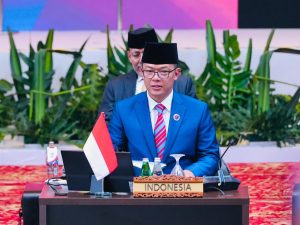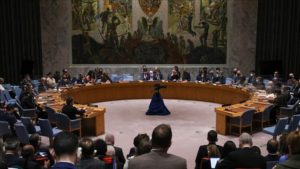
Knesset
, the Israeli Parliament, will vote on a bill that would remove Arabic from the list of official languages and declare Israel a Jewish state. (Photo: usnews)" width="374" height="254" /> The Knesset, the Israeli Parliament, will vote on a bill that would remove Arabic from the list of official languages and declare Israel a Jewish state. (Photo: usnews)by Teresa Welsh, a foreign affairs reporter at U.S. News & World Report
The bill would codify Israel as a Jewish state
The Israeli Knesset has postponed to next week its vote on a controversial bill which would officially classify Israel as the nation-state of the jewish people.
The bill, which passed in the cabinet 14-7, fuses the Jewish and civil portions of the law, a measure some say endangers Israeli democracy. It has to be passed by the Knesset, the Israeli legislative body, before it could become part of the basic law governing the country.
Also Read: The Forty-Four-Days of Glory: Azerbaijan’s Struggle for Justice and Peace
Israel does not have a constitution, but its declaration of independent says Israel is to “be based on the principles of liberty, justice and freedom expressed by the prophets of Israel; it will affirm complete social and political equality for all its citizens, regardless of religion, race, or gender,” usnews quoted by Mi’raj Islamic News Agency (MINA) as reporting on Saturday.
The bill would remove Arabic from the list of official languages. The state would instead “allow every resident” to preserve his or her own language and culture—wording which exempts the state’s responsibility to preserve such things. This means the state would no longer be obligated to provide the same resources to both Jewish and Arab citizens because Arab have no communal rights.
Former Knesset member Einat Wilf was a signatory of the bill when it was last proposed. She says many people have interpreted the bill without actually reading it and says it does not discriminate against Arabs.
“[Israel] will not be a binational state. That is the one thing it excludes,” Wilf says. “It does not exclude equal rights for all. Quite the contrary. It does not exclude cultural social collective expressions for the Arab minority, but it does exclude the possibility that Israel will be an Arab state.”
Also Read: Palestine Solidarity Month: A Collective Movement for Al-Aqsa and Palestine’s Freedom
Muslims and Christians make up 20 percent of the Israeli population.
The vote comes as violence between Palestinians and Israelis has smoldered in recent weeks, following the war in Gaza earlier this year. Peace talks to pursue a two-state solution collapsed in April and recent tension has made resumption nearly impossible.
Brookings Institution fellow Khaled Elgindy says passing the bill will not help promote peace between Israelis and Palestinians.
“It’s part of this assertion of Jewish-only anything and the fact that it comes on the heels of the problems in Jerusalem is I think intended to show that not only is Jerusalem Israel’s eternal undivided capital, is it exclusively Jewish,” Elgindy says. “I think it’s part of a very dangerous trend for Israeli politics and political culture in general.”
Also Read: Hassan al-Turabi: A Controversial Thinker from Sudan
He also says the concept of the Israeli nation-state bill is similar to sharia law in Islamic nations because it places religious doctrine above civil doctrine as a source of law.
“Israel is becoming a Middle Eastern state in the very illiberal sense, where you have the majoritarian outlook that is not really compatible with liberal democracy,” Elgindy says.
Israeli Prime Minister Benjamin Netanyahu said before the vote on Sunday the bill was necessary even though the country is 66 years old.
“There are many who are challenging Israel’s character as the national state of the Jewish people,” he said. “The Palestinians refuse to recognize this, and there is also opposition from within.”
Also Read: Who Exactly is the RSF Group Shaking Sudan?
Netanyahu faces pressure from his political right to respond swiftly and intensely to a rise in violence against Jews, including an attack last week that killed three rabbis while they were worshiping in a synagogue. His conservative Likud Party will hold primaries next year, and Knesset member Danny Danon has already announced his intention to run against Netanyahu.
“There are many Knesset members who are right of center who are trying to build their nationalistic credentials through populist legislation that champions Israel’s exclusive Jewishness,” says Ori Nir, the director of communications and public engagement for Washington, D.C.-based Americans for Peace Now.
He says Israel never previously codified its Jewishness so as not to exclude non-orthodox Jews in the Jewish diaspora.
“Once you try to legislate the Jewishness of Israel you enter into very murky territory,” Nir says. “Israel in the past was careful not to legislate that because of various reasons, maybe chiefly just the fact that there isn’t a unanimity on what being Jewish means.”
Also Read: The Two-State Solution (Palestine–Israel) in Historical Perspective
The Anti-Defamation League, an anti-Semitism organization, released a statement against the bill, saying it undermines the principle of Israel as a Jewish and democratic state.
“Attempts to further codify this concept in the Basic Laws are well-meaning but unnecessary,” the league’s National Director Abraham Foxman said. “It is troubling that some have sought to use the political process to promote an extreme agenda which could be viewed as an attempt to subsume Israel’s democratic character in favor of its Jewish one.”
Department of State spokesperson Jeff Rathke said the U.S. would expect the Israeli legislation to “continue Israel’s commitment to democratic principles.”
“Israel is a Jewish and democratic state in which all citizens should enjoy equal rights,” Rathke said Monday.
Also Read: Enchanted by K-Dramas, Dragged into Slander: Time for Muslims to Rise!
If the bill passes the initial vote in the Knesset, it will move on to receive markup and several other rounds of votes. If approved after its third reading, the bill would become part of Israel’s Basic Law. (T/P009/P3)
Mi’raj Islamic News Agency (MINA)
Source: http://www.usnews.com/news/articles/2014/11/25/israeli-knesset-pushes-back-vote-on-controversial-nation-state-bill
Also Read: Creating Opportunity and Avoiding Misery; Lesson Learn on Waste Recycling Issue































 Mina Indonesia
Mina Indonesia Mina Arabic
Mina Arabic